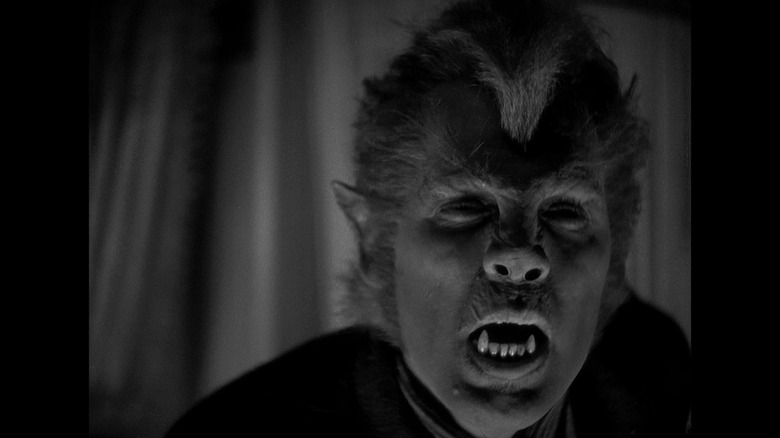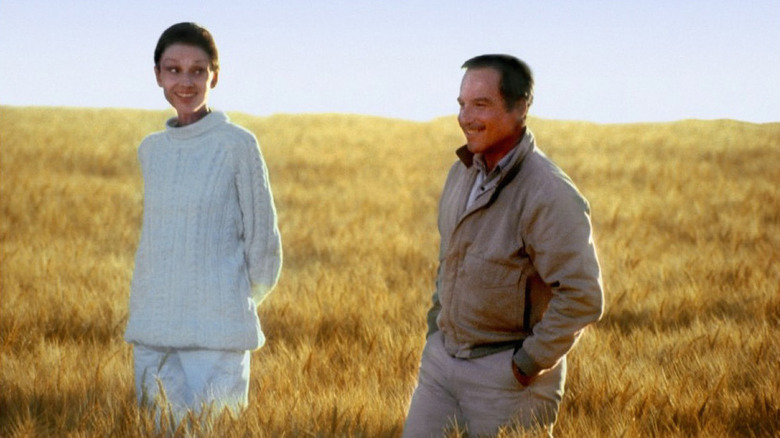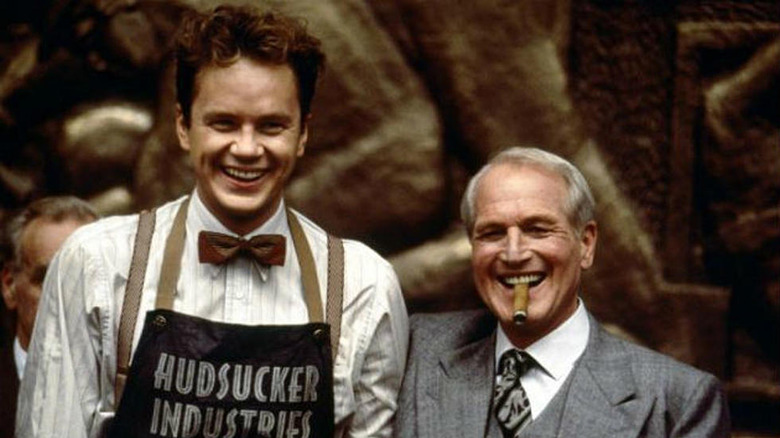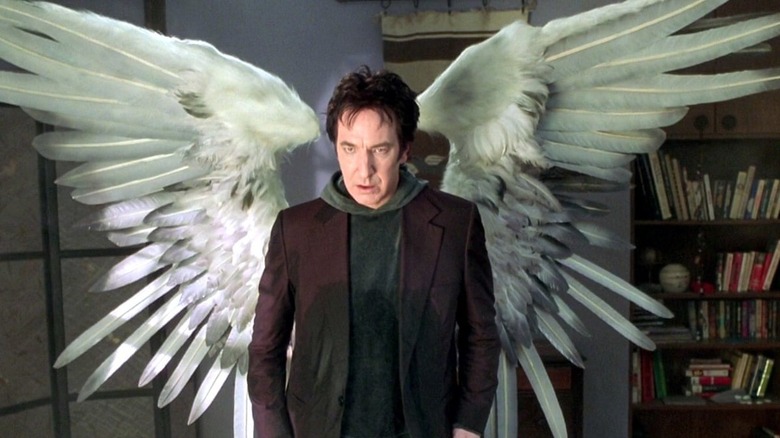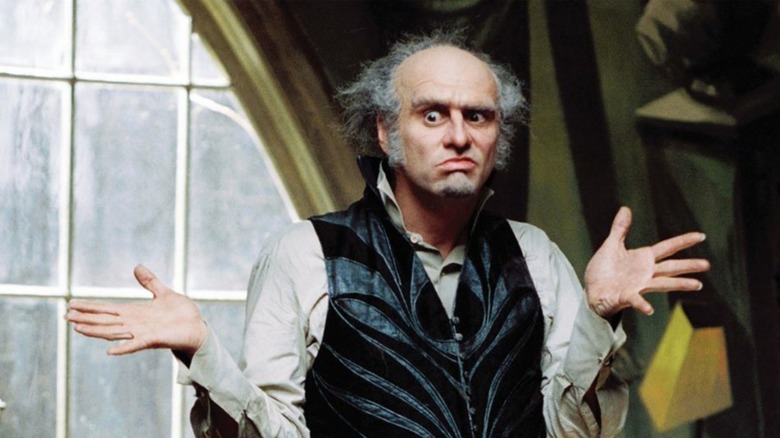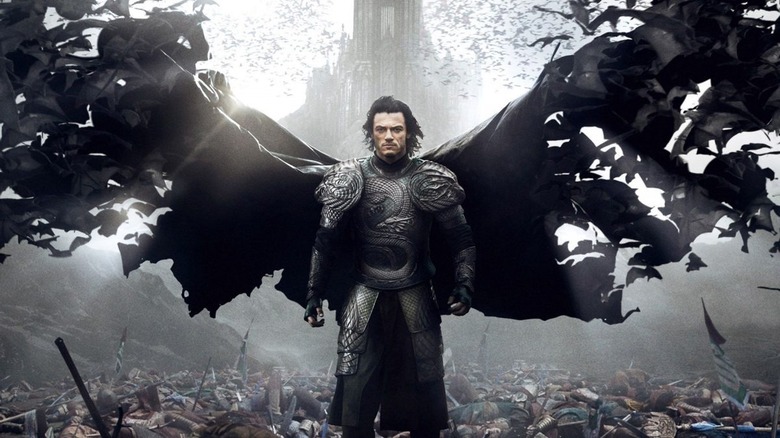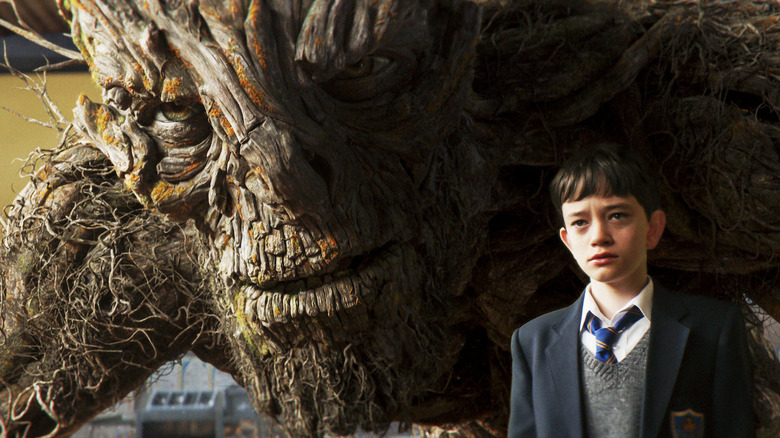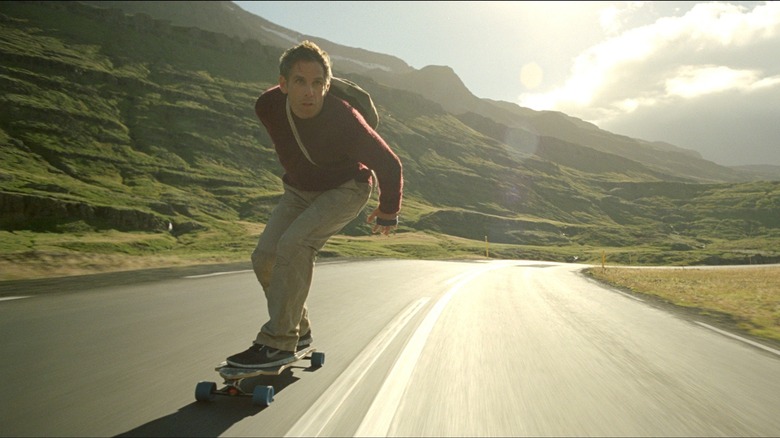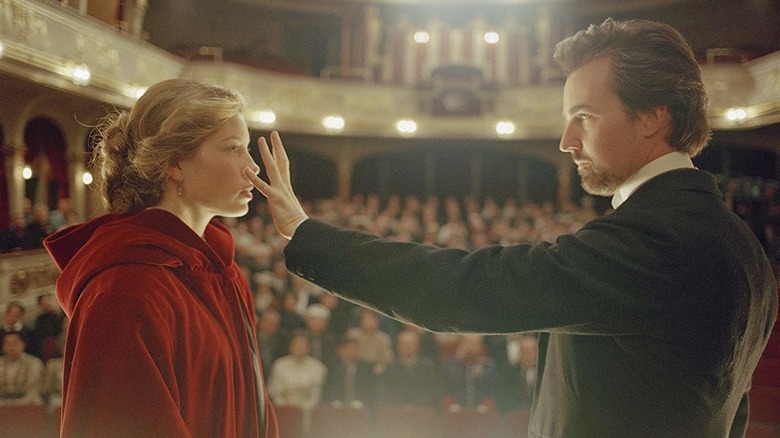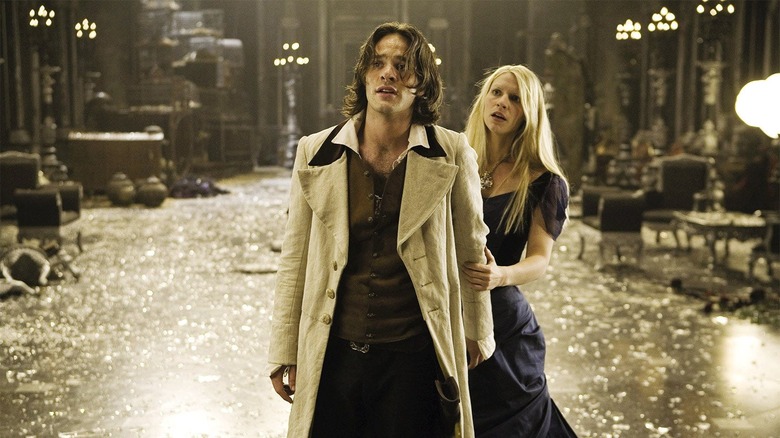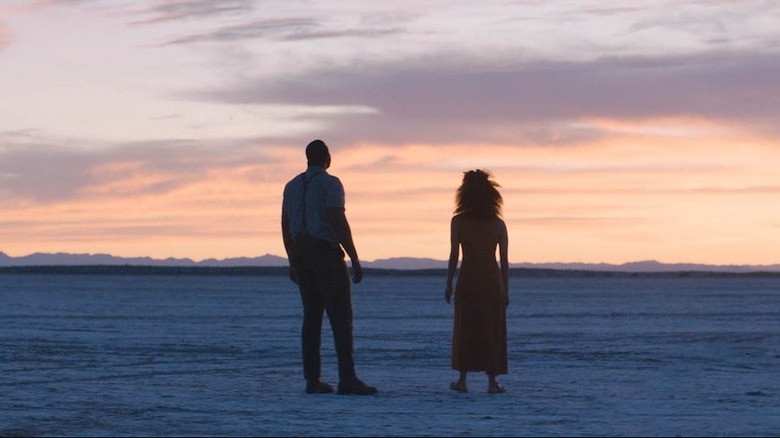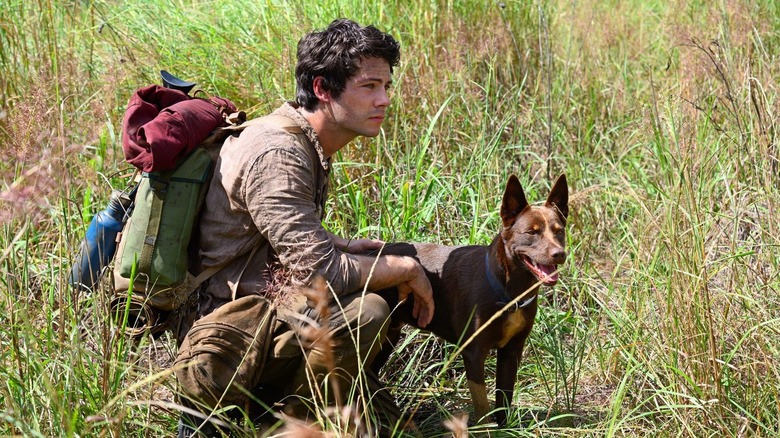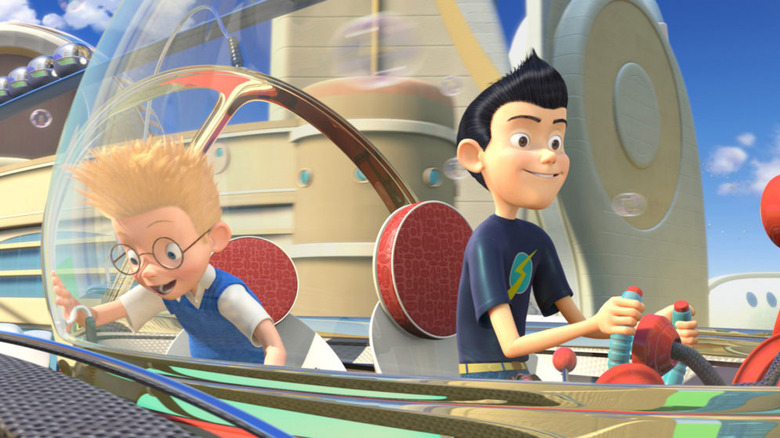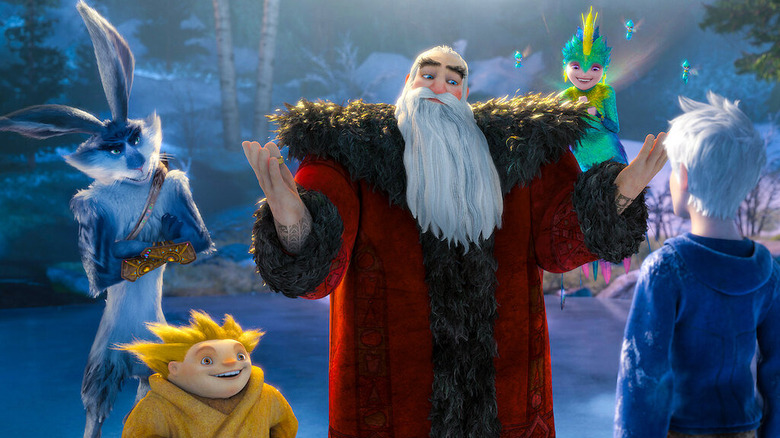14 Underrated Fantasy Movies You Need To Watch
Fantasy films have never had quite the same universal appeal as other films that fall under the "genre" label. Science fiction films have been box office successes since "Star Wars," and the current popularity of the superhero genre is often based on sci-fi elements. Horror films have never disappeared from the market, and both bigger franchises and low-budget indies are routinely successful. Westerns may not be as popular today as they were in the Golden Age of Hollywood, but the genre has gradually made a resurgence.
Fantasy films, however, have historically been a tougher sell. Getting an audience to accept complex mythology, and crafting believable creatures and magical elements can be a challenge. That said, when fantasy films succeed, the bets pay off big time. Two of the biggest franchises of the 21st Century have been "Harry Potter" and "The Lord of the Rings," and Disney routinely sees success with their fantasy animated films and live-action remakes.
With that in mind, here are 14 underrated fantasy movies you need to watch.
Werewolf of London
Beginning in the early 1930s, Universal Pictures launched several key iconic franchises under the Universal Monsters label. Long before the notorious failure of the "Dark Universe," these critical early films combined horror and fantasy with the definitive depictions of characters like Frankenstein, Dracula, The Mummy, The Blob, The Invisible Man, and The Creature From The Black Lagoon.
However, the cinematic werewolf was a much harder character to crack, and 1941's "The Wolf Man" proved to be the most iconic version of the character. Prior to Lon Chaney Jr.'s iconic performance, Universal first attempted to capture the essence of the character with 1935's "Werewolf of London." Although the later version would be the one Universal used in their subsequent crossover films, "Werewolf of London" has an important place in both horror and fantasy film history. The film follows Dr. Wilfred Glendon (Henry Hull), an English scientist who travels to Tibet to visit an archeological research facility.
While investigating the area for a rare plant, Glendon is attacked by a werewolf at night and bitten. It's not until he returns home to London that he realizes what that bite entails, and struggles to suppress his new werewolf transformations. Compared to other Universal horror films, "Werewolf of London" is less focused on body horror and pays closer attention to Glendon's anxieties about bringing harm to others. The film was iconically parodied in 1981 in John Landis's classic "An American Werewolf in London."
Always
Steven Spielberg is often thought of as one of Hollywood's best creators of cinematic magic, and he's frequently incorporated fantasy within his projects. One of the reasons Spielberg is such a consistently engaging filmmaker is his dexterity; Spielberg's work can't be pinned to just one genre or style. The fantasy films Spielberg has delivered over the years frequently intersect with other genres, which has afforded him a number of interesting methods for introducing audiences to magical concepts.
1989's "Always" is generally thought of as one of Spielberg's lesser films, but the completely earnest romantic fantasy adventure deserves another look from film fans. Spielberg's remake of the 1943 romantic drama "A Guy Named Joe" is wholly sincere, featuring a gorgeous score by John Williams and stunning cinematography from Mikael Salomon. Spielberg often tells dramatic stories from a child's perspective, and "Always" is a film about serious adult themes whose story is still told with an innocent aura.
"Always" centers around aerial firefighting pilot Pete Sandich (Richard Dreyfuss), who frequently undertakes dangerous missions. Pete's girlfriend Dorinda Durston (Holly Hunter) constantly worries about his safety, and her anxieties prove to be justified when he is killed amidst yet another perilous operation. Pete's essence is able to survive to observe Dorinda during her healing process, and he watches over her. While his presence is comforting, Spielberg doesn't make Pete's new role complete wish fulfillment, as he's unable to communicate with the woman he loves. Dreyfuss and Hunter have terrific chemistry, and John Goodman delivers a standout supporting comedic performance.
The Hudsucker Proxy
The Coen Brothers are two of the most essential American filmmakers, and in the decades since "Blood Simple" debuted, they've graduated from "best of a generation" status to "all-time great" consideration. The Coens are simply unpredictable, but there are recurring hallmarks in all of their films, specifically quirky dialogue, strange characters, shocking moments of violence, and chaotic non-sequiturs. The Coens tackle many genres, but there is an element of fantastical bewilderment within them all.
While the Coens have found continued success throughout their filmography, 1994's "The Hudsucker Proxy" is the rare box office bomb within their career. The Coens often homage older films and genres, and "The Hudsucker Proxy's" is a tribute to both classic Hollywood capers and slapstick comedies. The film follows the endearing (but generally clueless) businessman Norville Barnes (Tim Robbins), who works in the mailroom at the malicious company Hudsucker Industries.
Due to his lack of ambition and naive nature, Norville is selected by the senior board member Sidney J. Mussburger (Paul Newman) as the company's new leader. Sidney plots to set the company on a course for failure as part of an insurance scam. While he thinks having a dim-witted executive is the key, he's shocked to find that Norville is a success. Reporter Amy Archer (Jennifer Jason Leigh) attempts to expose Norville as corrupt, but becomes charmed by his warm personality. Strange elements of fantasy begin to appear through the presence of a large, magical clock tower.
Dogma
Kevin Smith's films include interesting references to pop culture and established fantasy franchises, and Smith has gradually grown the interconnected View Askewniverse throughout his career. Recurring characters appeared in "Clerks," "Mallrats," and "Chasing Amy," but 1999's "Dogma" was the most overt genre vehicle of the franchise. While his earlier films saw Smith's movie-obsessed characters talking about fantasy films, "Dogma" actually brought them into the fantasy world.
The film centers on two angels, Bartleby (Ben Affleck) and Loki (Matt Damon), who are kicked out of heaven by God and forced to live among mortals. Bartleby and Loki aim to get back into heaven by being absolved of their sins via a loophole created by the strange new cardinal (George Carlin), who offers absolution to anyone who enters his New Jersey church. While Bartleby and Loki's return would return them to heaven, it would mean circumventing the word of God, and thus casting all of existence into chaos.
The Voice of God (Alan Rickman) calls upon abortion clinic worker Bethany (Linda Fiorentino) to help stop Bartleby before he thrusts the world into oblivion, and she's joined by the forgotten apostle Rufus (Chris Rock) and the signature Jay (Jason Mewes) and Silent Bob (Smith) on a road trip adventure. Smith playfully tackles issues of faith, loss, and disillusionment, and the entire ensemble has great chemistry. Although it was very controversial during its release, "Dogma" is fairly sensitive in its approach to different perspectives.
Lemony Snicket's A Series of Unfortunate Events
The popular YA adventure series "A Series of Unfortunate Events" was turned into an also-popular Netflix series starring Neil Patrick Harris, but the madcap fantasy adventure stories were first adapted to the screen in a 2004 film from director Brad Silberling. While the show was able to flesh out the characters in greater detail, the film successfully captured the unique blend of eccentric side characters, creative problem solving, and shocking plot twists that made the books so beloved among young readers.
The Baudelaire children — Klaus (Liam Aiken), Violet (Emily Browning), and the infant Sunny — are left orphaned after their parents are tragically killed in a fire. The three are forced to live with their only living relative, the eccentric Count Olaf (Jim Carrey), who lives in an enigmatic mansion and conducts strange experiments. Olaf forces the trio to carry out laborious tasks while plotting to steal the fortune Violet will receive once she reaches adulthood. The story is narrated by a version of the author Lemony Snicket, here played by Jude Law.
Carrey delivers one of his zaniest performances ever (which is no small task), and makes for a comically entertaining villain that places the children in increasingly ridiculous dangers. It's fun to watch the children work together to survive each scenario.
Dracula Untold
Dracula is one of the most frequently adapted characters in cinematic history, appearing in literally hundreds of films. It is, therefore, quite the challenge for any new Dracula film to offer a fresh take on Bram Stoker's iconic gothic horror character. And nevermind the ones everyone's already forgotten about — the 1922 German expressionist film "Nosferatu," 1931 Universal Monsters film "Dracula," 1958 Hammer horror film "The Horror of Dracula," and 1992's gothic epic "Bram Stoker's Dracula" are all considered to be cinematic classics.
However, 2014's "Dracula Untold" offered an original take on the character by returning to the historical context of Stoker's original novel. Rather than using Dracula as a horror villain who pops up in jump scares, "Dracula Untold" followed Vlad the Impaler (Luke Evans) during his mortal days as Prince of Wallachia and Transylvania. A heroic warlord who defends his people from invaders, Vlad is forced to bear a curse from the Master Vampire (Charles Dance) in order to ward off the threat of Sultan Mehmed II (Dominic Cooper).
A Monster Calls
Fantasy stories often have the power to heal, and can be used to help people process their grief, sadness, and confusion. Fairy tales with simple imagery can contain powerful subtext, and just because a film has unbelievable elements doesn't mean it can't have powerful emotional weight behind it. J.A. Bayona's 2016 fantasy drama "A Monster Calls" highlights the challenging adolescence of a young boy who turns to fantasy as a means of coping with his reality.
Conor O'Malley (Lewis MacDougall) struggles to deal with his mother's (Felicity Jones) terminal illness, as they are separated from his irresponsible father Liam (Toby Kebbell) and no-nonsense grandmother (Sigourney Weaver). Conor is bullied relentlessly at school because of his sensitive nature, but he's given a window of hope each night when he's given visions of an organic monster (Liam Neeson) that inspires him to find inner strength. Bayona weaves in this dreamlike sequences among serious scenes between Conor and his mother, and MacDougall gives a standout child performance that captures his fragile emotional state.
The Secret Life of Walter Mitty
Ben Stiller is known as one of the most popular comic actors of his generation, but Stiller has also consistently proven himself to be a great filmmaker. Since "The Cable Guy," Stiller has brought the same talent and comedic zaniness he has as a performer to films like "Zoolander" and "Tropic Thunder." However, 2013's "The Secret Life of Walter Mitty" was a more dramatic fantasy adventure that saw Stiller show his range as both an actor and director.
In an adaptation of the classic 1939 short story by James Thurber, the film follows a shy photojournalist at LIFE Magazine who is tasked with gathering materials ahead of the publication's final issue. Walter Mitty (Stiller) works with the legendary photographer Sean O'Connell (Sean Penn), but when he goes missing, Mitty sets out on an adventure of his own. The introverted man has never done much traveling, and only imagines what grand adventures would look like through his vivid imagination.
The Illusionist
The 2006 magical fantasy film "The Illusionist" suffered from unfortunate timing, as it was released within only a few months of another period-piece mystery film centered on the world of magicians: Christopher Nolan's "The Prestige." Critics were quick to note the comparisons between the two, and most tended to favor Nolan's mind-bending deconstruction of two rival performers desperately trying to outdo each other. However, "The Illusionist" and "The Prestige" had different goals, and the former is successful as an emotional romantic epic.
"The Illusionist" is set at the end of the 19th Century in Vienna, and follows the performances of stage magician Eduard Abramovich (Edward Norton). Eduard yearns for the love of his childhood flame, Duchess Sophie Von Teschen (Jessica Biel), but the pair are separated by their socioeconomic differences. Eduard attempts to gain the favor of the upper class, but he's pursued by authorities. Like "The Prestige," "The Illusionist" is beautifully crafted in period detail, and both films received Academy Award nominations for best cinematography.
Stardust
Matthew Vaughn is a filmmaker who enjoys deconstructing genres and exploring why they continue to resonate. Vaughn famously lampooned the comic book movie genre with "Kick-Ass" before he took on a more serious deconstruction with "X-Men: First Class," and he continues to explore a satirical take on the James Bond universe with his ongoing "Kingsman" franchise. Vaughn was a natural fit for the source material of author Neil Gaiman, who famously crafts complex fantasy worlds with idiosyncratic stories and fun characters. Gaiman takes his stories seriously, but there is an element of winking satire that makes all of his work enjoyable.
Vaughn adapted one of Gaiman's most beloved novels with his 2007 film "Stardust," and unfortunately the film was not the franchise starter that it was intended to be. Set within medieval England, the film follows the young hero Tristan (Charlie Cox), who dreams of traveling beyond his secluded village of Stronghold. Tristan yearns for his childhood crush Victoria Forester (Sienna Miller), and attempts to court her by capturing a fallen star. The star itself has taken human form as the girl Yvaine (Claire Danes), and Tristan ventures out to take her back to Stronghold.
However, Yvaine is also the target of the villainous Prince Septimus (Mark Strong), who wants to use her power to claim the throne of the entire kingdom for himself. It places Tristan in danger, and it's fun to see the quirky hero grow throughout the adventure. Tristan gradually realizes his real love is Yvaine.
Nine Days
Fantasy films are often thought of as epic adventures about faraway places, but some of the greatest films within the genre are smaller and more intimate. A fantasy film doesn't have to center around a quest or preventing a villainous plot — some focus on more serious issues such as faith, hope, and the meaning of life using metaphorical fantasy elements. This year's stunning independent drama "Nine Days," for instance, is a brilliant work of existentialist storytelling that explores the eternal question of who has the right to exist.
The film is set within an arbitration home where souls travel before they take human form on Earth. The arbiter, Will (Winston Duke), is tasked with interviewing potential candidate souls before they make their way to the surface. Will is joined in the decision-making process by Kyo (Benedict Wong), who — unlike his co-worker — never lived on Earth. They're tasked with watching footage of the potential souls and living with them, and the decision becomes more difficult for Will when he becomes emotionally connected to a candidate named Emma (Zazie Beets).
Love and Monsters
The impact of COVID-19 meant that many interesting genre films intended for wide theatrical release were either pushed back or sent directly to streaming or digital rental, which unfortunately means that many of them have slipped under the radar among film fans.
2020's "Love and Monsters" wasn't just a refreshing fantasy adventure film that deserved a much larger audience, but a surprisingly perfect film for isolation viewing. Its playful approach to a post-apocalyptic environment tells a relatable story about struggling to find a connection amidst a global crisis (an angle that many viewers may have been able to relate to), but features enough comedic elements to not hit too close to home.
The film takes place amidst a chemical fallout in which Earth has been ravaged by mutant, monstrous creatures. Humanity's survivors live in small sects isolated from one another, and during the crisis, Joel Dawson (Dylan O'Brien) is separated from his girlfriend, Aimee (Jessica Henwick). Joel ventures out from the protection of his group to find his girlfriend, and he's accompanied by the dog, Boy.
Meet the Robinsons
"Meet the Robinsons" is a highly underrated animated film from Disney, and unfortunately the film was greeted with mixed reviews and an underwhelming box office performance. It's unfortunate, because the film combines fantasy and science fiction in an engaging way, and explores more serious concepts of destiny, kindness, and responsibility. It's rare for a mainstream family adventure film to be so focused on potentially confusing elements such as time travel, but "Meet the Robinsons" is a pleasant story of familial bonding that ends on an optimistic note about the future.
Lewis (Jordan Fry) is a 12-year-old inventor and orphan who desperately tries to find his birth mother while living in an adoption home. Lewis crafts all types of inventions, and one day he's mysteriously visited by an adolescent stranger named Wilbur Robinson (Wesley Singerman), who asks for his help in repairing a time machine. Wilbur brings Lewis to the future, introducing him to his idiosyncratic family of mystical and genetically-enhanced creatures. The pair attempt to stop the villainous Bowler Hat Guy (Stephen Anderson) from using another time travel device to wreak havoc on the future.
Rise of the Guardians
Holiday films often incorporate fantasy to tell heartwarming stories, and there are many Christmas classics within the realm of animation. It's hard for a new animated Christmas movie to stand up against beloved favorites like "How The Grinch Stole Christmas," "Rudolph the Red-Nosed Reindeer," "Santa Claus Is Coming To Town," and "Frosty the Snowman," but occasionally a new holiday favorite announces itself as a modern classic.
2012's "Rise of the Guardians" combines a heartfelt message about believing in kindness within an exciting adventure premise. In an "Avengers" style team-up, the young Jack Frost (Chris Pine) joins the team of Santa Claus (Alec Baldwin), the Easter Bunny (Hugh Jackman), the Tooth Fairy (Isla Fisher), and the Sandman to stop the villainous Nightmare King (Jude Law). The film delightfully subverts the expectations about these classic fantasy characters by putting them within an action movie premise, and the voice performances are all quite entertaining.

